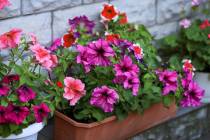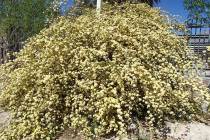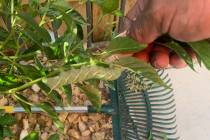Several hiking trails and viewpoints await those who make this journey and wish to get some exercise as they explore one of the world’s natural wonders.
Local Columns
We have a raised bed vegetable garden. For the last few years our tomatoes, zucchini and eggplants have produced little to no fruit.
Removing the old flowers (along with any unsightly flower stalks), or deadheading, is a common practice on repeat bloomers such as roses.
I get worried when a product says it gives season-long control of borers but the fruit is safe to eat after 21 days.
We are quickly approaching temperatures (and wind) that require watering figs three times a week. The higher temperatures demand more water for production to continue.
Hiking options may be limited, but Mount Charleston’s network of still-open trails offers plenty of picturesque views and potential discoveries.
Peaches are a lot easier to protect than figs. Figs must be picked when they are ripe. Peaches will ripen off the tree.
Gardenias have similar needs as roses. Their health and growth respond best to wood chip mulch decomposing on the soil surface.
My guess is that this tree was infected by this bacterial disease. I would not replace it. I would pick a different tree.
Do you have any thoughts on watering times and durations for lawns, fig trees and palms? What time of day should I set my sprinklers?
My Meyer lemon tree this year has hundreds of buds and flowers. Many on the same the branch or twig.
Birding gives Southern Nevadans plenty of opportunity to practice mindfulness, an ideal state in which people focus on the present to find a little calm.
There are lots of different kinds of petunias. For instance, the Madness Summer Series can take the heat, but petunias typically are not known for that.
Mulch of all types saves water and reduces weeding. But unlike rock mulch, wood chip mulch will rot into the soil.
Anyone who has been gardening for a while has a horror story or two about hornworms, which infest many vegetables in the tomato family.

















